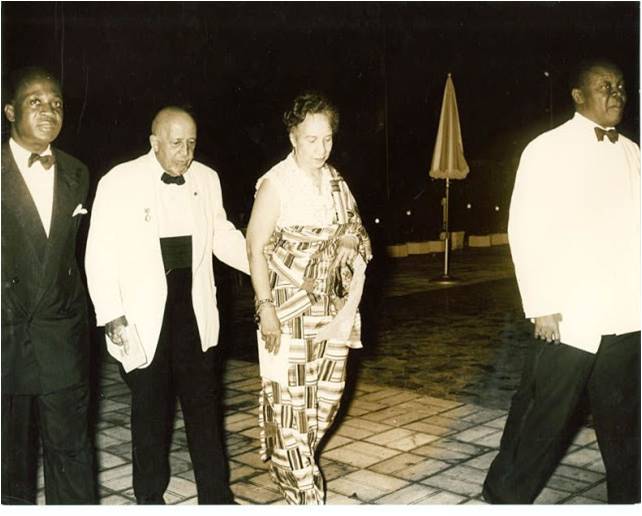African Independence.
In 1937 African American groups formed the Council on African Affairs, the first American lobby organization led by blacks. The council worked to raise awareness in the United States about the plight of Africans living under colonialism and advocated the liberation of African colonies.

Milton Obote was a great Pan Africanist right from his youth until he died in 2005.
It was headed by the internationally renowned black singer and film star Paul Robeson and included such important black scholars and activists as W. E. B. Du Bois, educator Alphaeus Hunton, future congressman Adam Clayton Powell, Jr., and educator Mary McLeod Bethune. The council also attracted African American artists such as singer and actor Lena Horne, who helped raise funds for projects.

William Edward Burghardt "W. E. B." Du Bois (February 23, 1868 – August 27, 1963) was an American sociologist, historian, civil rights activist, Pan-Africanist, author and editor.
Kwame Nkrumah
In the early 1940s Kwame Nkrumah, a native of the British-ruled Gold Coast (now Ghana) in West Africa, founded the African Student Organization in the United States. At the time, Nkrumah was a student in the United States.

In 1944 Nkrumah left America for London, where he joined an important group of Pan-Africanists led by Jamaican activist George Padmore and Trinidadian author C. L. R. James. Also in the group were Jomo Kenyatta of Kenya and Hastings Kamuzu Banda of Malawi, who, like Nkrumah, would eventually become leaders of their countries. In 1945 this group sponsored the fifth Pan-African Congress, which brought together numerous African nationalists and trade unionists. The meeting, held in Manchester, England, gave great impetus to the movement for African independence and fostered African leadership of the Pan-African movement.
In 1957 Ghana became the first sub-Saharan African state to gain independence, and Nkrumah became its first prime minister. Nkrumah held the Pan-Africanist view that the independence of Ghana would be incomplete without the independence of all of Africa. To work toward this goal, he appointed Padmore to establish a Pan-African Secretariat within the Ghanaian government. The secretariat pursued the twin goals of total African independence and continental political union in two series of international conferences, held between 1958 and 1961: First, the All-African Peoples' Conferences were held to stimulate independence movements in other African colonies.

Second, Nkrumah organized the Conferences of Independent African States to establish a diplomatic framework for the political union of Africa. By inviting representatives from independent North African states to the conferences and by holding the 1961 All-African Peoples' Conference in Cairo, Egypt, Nkrumah's intent was clearly to unite the entire African continent.

Kwame Nkrumah, W_E_B_ Du Bois, Shirley Graham Du Bois, and
unidentified man, ca_1963_jpg
In 1960 Nkrumah invited W. E. B. Du Bois to live in Ghana to act as an adviser and to initiate a project that Du Bois had proposed, the Encyclopedia Africana, a comprehensive encyclopedia of the culture and history of African peoples. Du Bois died in Ghana in 1963 with this project incomplete. However, the publication of several books during this period made Continental Pan-African philosophy more widely known. Notable among these books were Padmore's Pan-Africanism or Communism? (1956) and Nkrumah's Africa Must Unite (1963).
In 1960, 17 African countries gained independence. By the end of 1963, approximately 80 percent of the African continent was independent. Nkrumah's goal of establishing a United States of Africa with a centralized power structure was opposed by the leaders of many of the new African countries, who resisted giving up their nations' newfound autonomy.

In May 1963 representatives from 32 African nations of both North and sub-Saharan Africa met in Addis Ababa, Ethiopia, and founded the Organization of African Unity (OAU) as a loose federation of independent African states committed to continent-wide cooperation. The unfinished African independence movement, political differences among the independent nations, and the poverty of the African continent kept political union from becoming a reality.
National Movements and New States in Africa